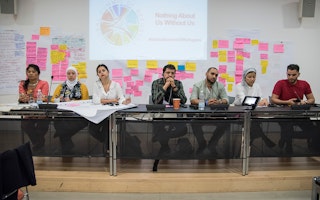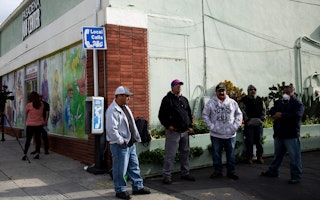Pledges Alone Won’t Improve the Lives of Refugees
By Eleanor Acer

Last week, the United Nations held a high-level meeting on refugees and migrants, followed the next day by President Obama’s Leaders’ Summit on Refugees. The two major events were an opportunity for the world’s states to show that they can work together to address the worst displacement crisis since World War II. And they produced some notable pledges. But many failed to demonstrate the urgent commitment needed to reverse policies blocking access to asylum and undermining refugees’ human rights.
Many civil society groups were disappointed by the lack of concrete and immediate commitments to adopt an equitable and objective responsibility-sharing system for refugees. Such commitments are needed urgently. More than 65 million people are displaced globally, and the number of refugees now exceeds 21 million. Ten countries host 58 percent of all refugees, and hundreds of thousands are struggling to survive.
At President Obama’s summit, nations pledged to take in more refugees, provide more aid, and increase refugees’ access to education and work. Funds pledged for UN appeals and agencies increased by $4.5 billion, and pledged resettlement slots and others pathways to safety nearly doubled to 360,000, according to U.S. statements.
But as UN Ambassador Samantha Power noted, the pledges are “still only a fraction” of the necessary action. And pledges are only that—many countries still haven’t fulfilled the commitments they made earlier this year.
What’s more, increasing aid and resettlement isn’t sufficient because this isn’t only a humanitarian crisis. It’s a human rights crisis, too. States have blocked many thousands from crossing borders to access international protection and have deprived many more of their rights to liberty, work, and education.
While refugees languish at borders trying to escape to safety, wealthy nations have created too many barriers to entry. Flawed screening processes, interception measures that block access to protection, and deterrence-driven detention policies harm refugees and migrants and erode respect for refugee and human rights law globally.
Moreover, in the negotiations leading up to the UN summit, the United States and others sought to undercut global human rights standards, including legal prohibitions against the detention of children.
When I spoke at the UN summit, I shared a letter from a group of children held in migration detention for a year in the United States. “It pains us to know that the school year is starting,” they wrote. “We can’t concentrate because of the frustration that we feel locked up here like criminals when in reality we are innocent.” Fortunately, despite the disappointing negotiating maneuvers of some states, countries agreed to work to end the practice of detaining children.
But it was the summit, coupled with pressure from human rights advocates, that compelled the Obama administration to meet its modest, but meaningful, goal of resettling at least 10,000 Syrian refugees this year. The United States also announced it would launch a private resettlement pilot initiative and will increase the number of refugees it resettles by 25,000 in 2017—far from enough, but a step in the right direction.
At Human Rights First, we’ll continue to push for an end to the cruel policy of detaining children, and work towards other crucial reforms, such as changing policies that block access to asylum, ending practices that violate refugee protection and human rights commitments, and increasing aid and resettlement to meet the global need. Advocates will need to ensure that the compacts on refugees and migrants, which are planned to be developed over the next two years, are effective tools for improving the lives of refugees and migrants, rather than undermining existing protections.
The real question is whether wealthy nations will work together to fully and equitably support frontline refugee hosting communities through resettlement aid and other investments. Will the states that border Syria allow refugees now blocked from entry at their borders into their countries? Will European countries stop impeding access to asylum? Will countries, including the United States, end migration detention policies that violate international law?
Only time will tell, but in the meantime, advocates will need to redouble their efforts to push for more action that respects human rights.
Human Rights First is a grantee of the Open Society Foundations.
Eleanor Acer is senior director of refugee protection at Human Rights First.


